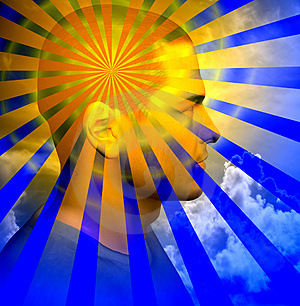
Question (Unedited) :
Can you explain how a person can adhere only to their traditional rites and rituals, without practicing the teachings in Buddhism?
My comment:
Hi B...,
Let me digress a little before answering your question.
It is a very common problem if we observe very carefully how people around the world "practise" their respective religions. In primitive "religions", there is nothing but ignorant superstitions based on fear of the unknown and trying to appease the wrath of nature. The natural instinct is to pray to these natural forces and finding ways to appease them by offering sacrifices and chanting incantations. Along the way there would be some smart Alex taking the role of experts in these rites and rituals, and the birth of a "religion" took place.
If we look into the basic or fundamental teachings of the major religions, rites and rituals are not found in their "holy books". And for the same religion which originated from one founder, there arose different sects because of subsequent different interpretations to suit the different practitioners of the time, for whatever reasons better known to them. Inevitably different rites and rituals were created to suit the respective tribes or races. We are witnessing today not the practice of the pure teachings of the various faiths, but only the different rites and rituals created to boost the egos of the human race. If we study the really good people with spiritual wisdom, they were all very peace-loving people. There are three very outstanding personalities with such spiritual attributes. They are Mahatma Gandhi, Mother Theresa, and the present Dalai Lama. They practised universal values of good moral conduct of love and peace. The whole world is in chaos in the name of religion because of the people's misinterpretations and misunderstanding of the whole spectrum of the fundamental teachings of the great religious founders. The intolerance and bigotry in the name of religion are the faults of selfish and ignorant adherence mostly being indoctrinated from birth while others being influenced later in life.
Coming back to your question; Buddhism is a very tolerant, liberal and accommodating "religion". Truth is truth; irrespective of who you are, where you come from, and whatever tradition you practise. Different nationalities are able to practise Buddhism without having to discard their traditions and cultures. You would notice that different nationalities practise Buddhism differently while retaining their cultural beliefs and traditions. They actually incorporate Buddhism into their existing culture and traditions. That is why today we have Tibetan Buddhism, Chinese Buddhism, Japanese Buddhism, and even Western Buddhism! The original teachings of the Buddha in its pristine form did not emphasize on rites and rituals. Whatever rituals being practised at that time were purely Indian traditions. The Buddha's teachings remain pure and simple, encompassing the 4 Noble Truths and the Noble Eightfold Path. The different rites and rituals you see are purely peculiar to the different nationalities which practise Buddhism incorporating their own traditions and cultural practices.
It is very fascinating to see how the Tibetans, and the Chinese perform their rites and rituals. There are alot of bowing, kneeling, and prostrating. There are a lot of praying paraphernalia and colourful robes and even different caps and crowns!! The Buddha lived in India following Indian tradition. He discarded his princely attire and jewellery and forsaken his crown in exchange for a simple robe. Definitely he didn't introduce those "alien" rites and rituals and praying paraphernalia and colourful attire!! It is very obvious then, that to indulge in the rites and rituals does not necessarily mean to practise the teachings of the Buddha. It is a fact that quite a proportion of "Buddhists" who indulge in their respective rites and rituals do not even know the basic teachings of the Buddha. This is a big problem within the Asian communities being born into "Buddhist" families without even knowing who the Buddha was. So what these people do in the name of Buddhism is just performing empty rites and rituals; nothing to do with the pristine teachings of the Buddha. Quite embarrassing, actually!


